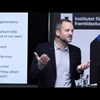mach
A march for science and research!
Alternative facts and fake news. These are phenomenons that March for Science wants to counteract. March for Science will be organized in 400 cities around the World on the 22nd of April, highligting th
Jules Holroyd: Holding each other accountable for implicitly biased behaviour
Jules Holroyd, Assistant Professor at the Faculty of Arts at the University of Nottingham. ABSTRACTMany of us will have implicit racial biases: dispositions to certain affective or cognitive responses

How Much Do People Value Future Generations?
Malcolm Fairbrother is professor of sociology at Umeå University and researcher at the Institute for Futures Studies. In this seminar he presents the paper "How Much Do People Value Future Generations?
Does semantic information need to be truthful?
Synthese 196(7): 2885–2906. doi.org/10.1007/s11229-017-1587-5 Abstract The concept of information has well-known difficulties. Among the many issues that have been discussed is the alethic nature of a se
Hanna Wass: Too much of a good thing? The future of the antifragile democracy
Hanna Wass is an Academy Research Fellow and University Lecturer in the Department of Political and Economic Studies at the University of Helsinki. ABSTRACT As a potentially antifragile system, the stre

How much crime can foreign background explain? with Amber Beckley
Can the number of people with foreign background living in an area explain the level of crime in that same area? In this talk Amber Beckley gives us the numbers and finds a correlation that points cle
Too much or too little? A short-term longitudinal study of youth's own economic resources and risk behaviour.
Journal of Adolescence, Vol 66, pp. 21-30, doi.org/10.1016/j.adolescence.2018.04.005. Abstract This study examined socioeconomic differences in risk behaviours according to youth-oriented measures of eco
How much scope for a mobility paradox? The relationship between social and income mobility in Sweden
Sociological Science 3:39-60. 10.15195/v3.a3. Abstract It is often pointed out that conclusions about intergenerational (parent–child) mobility can differ depending on whether we base them on studies of c
Malcolm Fairbrother (presenter): How Much Do People Value Future Generations? (paper together with Gustaf Arrhenius, Krister Bykvist, Tim Campbell, webinar)
Malcolm Fairbrother is professor of sociology at Umeå University and researcher at the Institute for Futures Studies. In this seminar he presents the paper How Much Do People Value Future Generations? C
On revolutions
Palgrave Communications, volume 6, Article number: 4 (2020). doi.org/10.1057/s41599-019-0371-1 Abstract Sometimes the normal course of events is disrupted by a particularly swift and profound change. His








